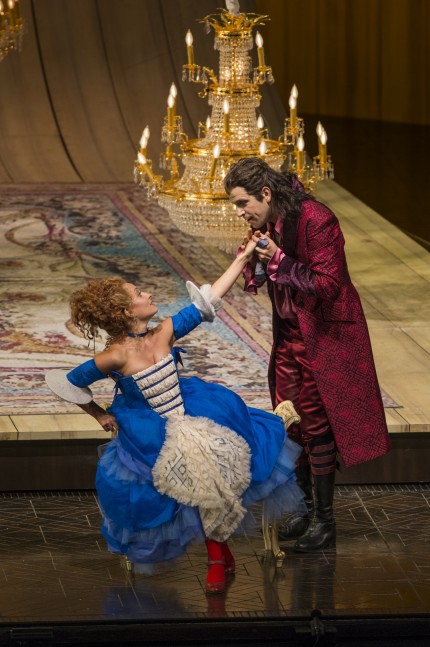Pleasures are few in Lyric Opera’s garish, charmless “Figaro”

Christiane Karg and Luca Pisaroni in the Lyric Opera of Chicago’s production of Mozart’s “Le nozze di Figaro.” Photo: Michael Brosilow
One year ago, the Lyric Opera opened their season with an audacious, remarkably fresh new production of Mozart’s Don Giovanni. Directed by Robert Falls, the edgy, updated staging was faithful to the tale of the murderous libertine yet freshened it up in an imaginative way while always keeping Mozart’s music front and center.
The company was clearly hoping that lightning would strike again this season with another new Mozart production helmed by a noted stage director. Barbara Gaines of Chicago Shakespeare Theater made an impressive Lyric directing debut five years ago with a riveting take on Verdi’s Macbeth. What could go wrong with entrusting one of the great Mozart-da Ponte comedies to Gaines?
Unfortunately, almost everything. Lyric’s new production of Le nozze de Figaro, which opened Saturday night at the Civic Opera House, is about as dismal a misfire as Falls’ Giovanni was a roaring success. Crass, garish and charmless, it marks a low point in the company’s recent Mozart history and distinguished line of Figaros.
Intrusive added pantomime during the overture is invariably an ominous sign and so it proved. The Count chases a maid up the Civic Opera House aisle and onto the stage with the Countess in pursuit. That set the sophomoric tone for the evening.
Gaines brought dramatic sizzle and concentration to the homicidal Macbeths, yet the Shakespeare director seems completely at sea in Mozart comedy. Her production makes the mistake common to inexperienced Mozart directors that if everyone mugs outrageously that makes for a hilarious evening. She doesn’t seem to appreciate the fact that it is the timeless human romantic situations that provide the humor in the opera, not morphing the scenario into a live-action cartoon.
While Falls’ Giovanni never allowed the stage action to dominate Mozart’s music, Gaines’ frenetic high-jinks firmly push the singing into the background at the expense of constant sexual shtick. The Act 2 scene in the Countess’s room takes place on a massive bed, Cherubino sings “Non so piu” while groping Susanna and humping her from behind, and hands up skirts and frantic breast- and behind-grabbing dominate the lewd action.
Things are made worse by the awe-inspiring vulgarity of Susan Mickey’s garish costumes. In the first two acts the principals are all dressed in retina-searing primary colors with ludicrous exaggeration. Marcellina’s feathered getup looks like a Black Friday mark-down from The Lion King.
Colin Ure’s Captain Obvious surtitles were at their lowbrow worst. Does the company think Lyric audiences are too dumb to appreciate an accurate translation of Lorenzo da Ponte’s witty libretto unless Ure ladles on every possible colloquial vulgarism? Some examples: “sleazebag,” “What a bitch!” “This really screws me up.” “Don’t even go there” “The Count is pissed.” And so on. Oy vey.
But that’s all of a piece with the prevailing sit-com adolescence and complete lack of taste in this show.
Apart from the massive bed, James Noone’s spare sets were the one relatively subdued element, with towering blond-wood panels, a maze of chandeliers in Act 3 and a reflecting pool that the Count and Countess frolic in at the end of the opera.
If a firmer hand on the singers was manifest from the pit, this Figaro might have had a chance. Yet in another inexplicable Lyric baton debut, Henrik Nánási’s conducting proved workmanlike at best. The Hungarian conductor failed to enforce full note values from the singers, balances were often off and the orchestra bested voices in ensembles. Andrew Davis’s witty and polished Mozart touch was greatly missed.
Luca Pisaroni emerged the most unscathed from the staging, segueing gracefully to the Count from his well-regarded Figaro. The role lies a bit high for his dark bass-baritone yet Pisaroni conveyed the Count’s bluster and frustration and his vehement Act 3 aria was a highlight.
Making her Lyric debut, Christiane Karg was a charmless Susanna, emerging less like a coy, artful minx than a slattern of unvaried hard-edged pertness. Karg’s vocalism was more engaging, the petite German soprano delivering a lovely, luminous “Deh vieni, non tardar.”
Hobbled by Gaines’ staging and some of Mickey’s most unfortunate costuming, Amanda Majeski’s Countess completely lacked poise, refinement or class. Rather than an elegant melancholy figure, Majeski was apparently encouraged to play her as a licentious, bubble-headed bimbo, who rolls around on the bed with Cherubino, compulsively wolfs down pastries, and plops cake on the Count’s chest at the end of Act III like Lucille Ball. Majeski’s vocalism was similarly uneven with phrase endings trailing off in a pedestrian “Porgi, amor” though she offered a more fluent, focused “Dove sono.”
Adam Plachetka possesses a robust bass-baritone and characterized vividly as the wily Figaro but the Czech singer’s lower register too often faded away with an overly casual approach to his projection and singing.
Rachel Frenkel sang consistently as the hormonally gifted Cherubino, though the tawdry staging had the Israeli mezzo-soprano engage in most of the distracting sexual actions that undermined her character rather than enhancing her vocal moments.
The one genuinely funny characterization was Keith Jameson’s flaming Basilio, making one wish that he would have received his sole aria. Brindley Sherratt was a worthy Bartolo, Katherine Goeldner a characterful Marcellina, Hlengiwe Mkhwanazi a serviceable Barbarina.
Cenerentola opens in a week. Let’s hope for better things.
Le nozze di Figaro runs through October 24. lyricopera.org; 312-827-5600.
Posted Oct 13, 2015 at 10:26 am by David
Dear Larry ,
Unfortunately, your review is right on target. It is depressing to see another example of Lyric’s “bottom-feeding.” The problem is so easy to fix, but they need new management I’m afraid to say. Many other opera companies are paying attention to their opera vision, not selling out by presenting Broadway or mariachi. We live in hope.